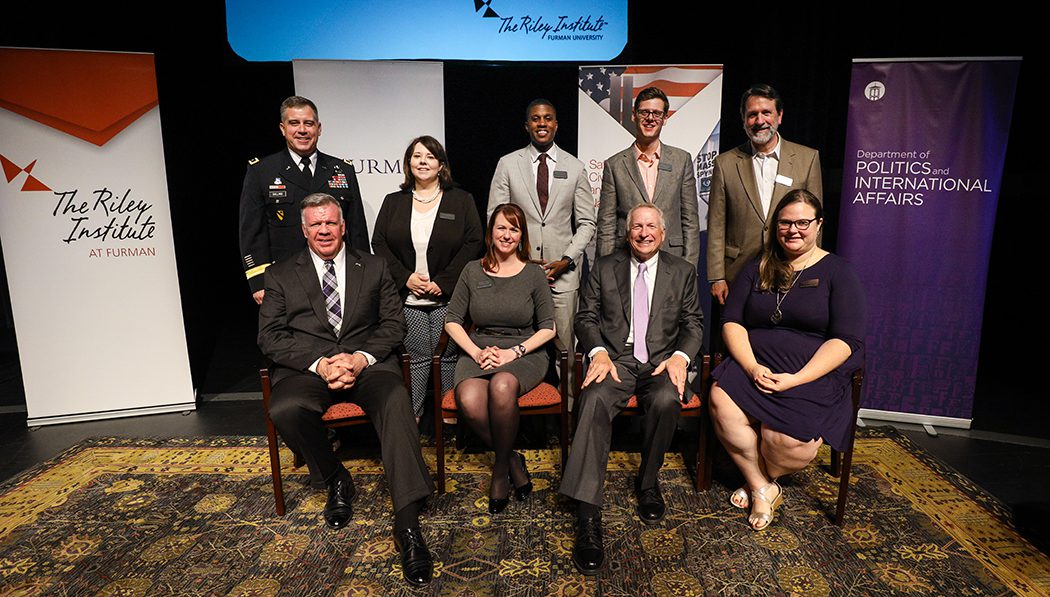Safe and Free?

Hundreds of students and community members gathered for two nights, April 10 and 11, to hear the insights of ten distinguished Furman alumni speaking on their personal experiences in working to balance national security and civil liberties. The symposium, “Safe and Free: Civil Liberties and the Fight for National Security,” was presented by Furman University’s Riley Institute and the Department of Politics and International Affairs.
On April 10, Lt. Gen. John Mulholland ’78, U.S. Army (Ret.) spoke about his efforts as commander of Special Operations Command Central and associate director for Military Affairs for the CIA. “Ensuring our country remains free is the foremost civil liberty,” he said in his keynote address.
He elaborated on the complexity of ever-evolving threats, including cyber threats, and how rifts within our society can make us a more vulnerable target to enemies. “We must be able to talk and debate but maintain a solid shoulder-to-shoulder front to our adversaries,” he said.
Afterward, former Furman President David Shi ’73 led a discussion featuring Mulholland as well as Maj. Gen. Chris Ballard ’84, commanding general, U.S. Army Intelligence and Security Command; Sheana Cavitt ’04, senior professional, Johns Hopkins University Applied Physics Lab; and Jennifer Lambert ’01, deputy director, Office of Analytics, Bureau of International Programs, U.S. Department of State.
The discussion included questions submitted via text by the audience, and covered topics including chemical weapons, North Korea’s ballistic missile program, the recent strikes in Syria and advice for students on pursuing a career path.
Ballard pointed out that college major isn’t as important is a liberal arts education that prepares students for opportunities that arise. Mulholland agreed, adding, “Nobody owes you anything. Life can be tough, so be motivated by your passion.”
Nathan Mathai, a senior accounting major, appreciated hearing about the high-profile careers the alumni had built. “I think it gives you perspective, so you can dream bigger beyond the Furman gates,” he said. “When you see people like this connected in various facets of public policy and government issues, then you understand your degree can be applied outside your major. I appreciate that they have these jobs and come back and spend time with us.”
The second night of the event delved more deeply into freedom of speech and privacy, with a keynote address from Vice Admiral Mike McConnell ’66, U.S. Navy (Ret.), former U.S. director of national intelligence. He made the case for government surveillance, saying that while they tend to love spy movies, “America hates spies.”
He offered many examples of how spying saved lives, including code-breaking in World War II and searching for Osama bin Laden after 9/11. A New York Times report informed Bin Laden that he was being spied on via his cellphone, and he then got rid of it—and it took another decade to track him down, McConnell said.
The advent of the internet, fiber optics and other developments have transformed terrorism and spying, he said. “The old rules served us well, but the world has changed so dramatically,” he said. “We have to reevaluate the rules.”
Now, economic espionage poses an additional threat, and “there isn’t a computer on the globe that can’t be infiltrated,” he said.
McConnell was then joined for discussion by Eli Dourado ’02, formerly director of Technology Policy Programs at George Mason University; Maurice Owens ’00, manager of policy and governmental affairs at Libra Group and former coordinator of Pres. Barack Obama’s situation room; Mike Roosevelt ’81, former senior intelligence officer, CIA; and Jessica Taylor ’07, lead digital reporter for NPR.
The robust discussion touched on Edward Snowden’s revelations, with the panel divided on the public’s right to know about the depth of spying programs vs. the damage done to the intelligence community. Taylor pointed out that the American public accepts the need for additional spying the wake of events like 9/11, “but then support wanes as it fades from public consciousness.”
Dourado said the topic can’t be simplified into good vs. evil, and that many bureaucrats are good people, but that citizens should know the scale of domestic surveillance, if not the details.
As on night one, the panel recognized the difficulty in handling the alleged Russian tampering in the 2016 election. Taylor said the effort was designed to “erode confidence in our institutions,” including Congress, the media and the intelligence community, and that effort was successful.
Roosevelt pointed out that they accomplished this “for less than the cost of a battle tank,” thanks to the internet and social media.
Attendee Shannon Cherney, a junior politics and international affairs and communication studies major, said the issues covered at the event were daunting and she is concerned about threats, “but everyone needs to be aware of these issues, and I feel better knowing that these types of people are looking out for us,” she said.
Both nights, the panel pointed out that one key way to prevent Russia or other countries from eroding faith in our democracy is simple: vote.”If they are discrediting our democracy, then we need to double down and prove them wrong,” Ballard said to enthusiastic applause on night one.
McConnell ended night two on a similar note. “The single most important thing everyone can do is vote,” he said.